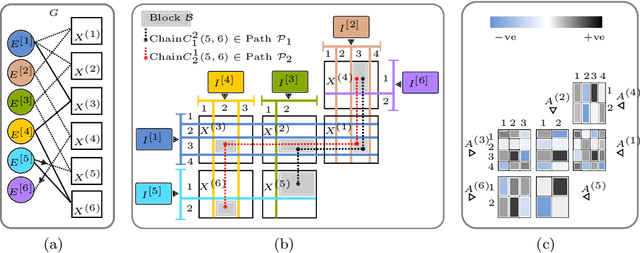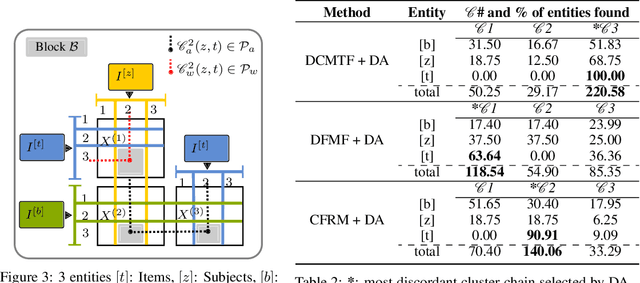Ragunathan Mariappan
Multi-way Clustering and Discordance Analysis through Deep Collective Matrix Tri-Factorization
Sep 27, 2021



Abstract:Heterogeneous multi-typed, multimodal relational data is increasingly available in many domains and their exploratory analysis poses several challenges. We advance the state-of-the-art in neural unsupervised learning to analyze such data. We design the first neural method for collective matrix tri-factorization of arbitrary collections of matrices to perform spectral clustering of all constituent entities and learn cluster associations. Experiments on benchmark datasets demonstrate its efficacy over previous non-neural approaches. Leveraging signals from multi-way clustering and collective matrix completion we design a unique technique, called Discordance Analysis, to reveal information discrepancies across subsets of matrices in a collection with respect to two entities. We illustrate its utility in quality assessment of knowledge bases and in improving representation learning.
Multi-way Spectral Clustering of Augmented Multi-view Data through Deep Collective Matrix Tri-factorization
Sep 12, 2020



Abstract:We present the first deep learning based architecture for collective matrix tri-factorization (DCMTF) of arbitrary collections of matrices, also known as augmented multi-view data. DCMTF can be used for multi-way spectral clustering of heterogeneous collections of relational data matrices to discover latent clusters in each input matrix, across both dimensions, as well as the strengths of association across clusters. The source code for DCMTF is available on our public repository: https://bitbucket.org/cdal/dcmtf_generic
Deep Collective Matrix Factorization for Augmented Multi-View Learning
Nov 28, 2018



Abstract:Learning by integrating multiple heterogeneous data sources is a common requirement in many tasks. Collective Matrix Factorization (CMF) is a technique to learn shared latent representations from arbitrary collections of matrices. It can be used to simultaneously complete one or more matrices, for predicting the unknown entries. Classical CMF methods assume linearity in the interaction of latent factors which can be restrictive and fails to capture complex non-linear interactions. In this paper, we develop the first deep-learning based method, called dCMF, for unsupervised learning of multiple shared representations, that can model such non-linear interactions, from an arbitrary collection of matrices. We address optimization challenges that arise due to dependencies between shared representations through Multi-Task Bayesian Optimization and design an acquisition function adapted for collective learning of hyperparameters. Our experiments show that dCMF significantly outperforms previous CMF algorithms in integrating heterogeneous data for predictive modeling. Further, on two tasks - recommendation and prediction of gene-disease association - dCMF outperforms state-of-the-art matrix completion algorithms that can utilize auxiliary sources of information.
 Add to Chrome
Add to Chrome Add to Firefox
Add to Firefox Add to Edge
Add to Edge